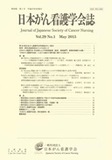Japanese
English
- 販売していません
- Abstract 文献概要
- 参考文献 Reference
- サイト内被引用 Cited by
要旨
本研究の目的は,積極的な治療継続のため大学病院から地域医療支援病院へ転院を告げられたがん患者が,転院を受け入れ新たな環境で人との関係性を構築するプロセスを明らかにし,その過程を支援する看護実践への示唆を得ることである.
対象は,A大学病院からB地域医療支援病院へ転院した消化器がん患者13名である.転院後に半構成的面接を行い,修正版グラウンデッド・セオリー・アプローチ(M-GTA)を用いて分析した.その結果,本プロセスは,転院前の『葛藤を乗り越え新たな環境への準備を整える体験』を経て,転院後の『新たな環境で人との相互作用を意識しながら生きる体験』に至った.転院前の体験は〈青天の霹靂である転院告知への困惑〉から始まった.転院後は,初対面の医療者への不安を抱くというような《未知の環境へ入ることへの困惑感》が生じたが,看護師の歓迎の態度に触れ人との繋がりを希求し,歩み始める.そして対象者らは,自らの身体や社会性の回復という転換点を経て《深まる人との繋がり》を獲得した.
また,両プロセスにおいて,がんと闘うための手段である〈治療へ託す生への希望〉が存在していた.転院を告げられたがん患者の特徴としては〈もう治らないがんという認知〉を抱き,負のスパイラルに陥ることが明らかになった.看護師は,転院患者の認知を把握し受け止め,負のスパイラルに陥ることなく精神的に安定し,転院を受け止め適応できる環境を整えることが重要であり,それは,地域完結型医療への転換を促進できる支援に繋がると考える.
The aim of this study was to clarify the process, from acceptance to the building of new relationships, undertaken by cancer patients in a university hospital informed that they were being transferred to a regional medical support hospital for continuation of active treatment. We also sought to obtain insight into nursing practices that would support this process.
Subjects comprised 13 gastrointestinal cancer patients who transferred from University Hospital A to Regional Medical Support Hospital B. Semi-structured interviews were conducted after the transfers, and were analyzed using a modified grounded theory approach. Results showed that the process went from “the experience of overcoming mental conflict and preparing for the new environment” before transfer to “the experience of living in a new environment while being mindful of interactions with others” after transfer. Experiences before transfer started with “bewilderment at the transfer notice, which came like a bolt from the blue”. After transfer, patients experienced “confusion in entering a new, unknown environment” accompanied by anxiety about medical professionals they were meeting for the first time; however, the welcoming attitude of nurses allowed them to begin making steps forward in creating bonds with creating bonds with others. As a result, from the turning point of recovery in terms of both physical and social states, they experienced “deepening connections with others,” which were subsequently reinforced.
In both processes, “trusting the treatment based on the desire to survive” was the apparent method of battling cancer. One characteristic of cancer patients told they were being transferred was that they “thought this meant the cancer could no longer be cured” and descended into a negative spiral. It is thus important that nurses recognize such thought processes in patients to ensure psychological stability and help prevent patients from falling into a negative downward spiral. An environment that facilitates acceptance of and adaptation to transfer must also be created, as this was thought to help promote a system of complete community medical care.
Copyright © 2015, Japanese Society of Cancer Nursing All rights reserved.


